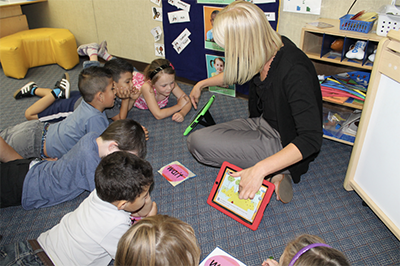
Tools and techniques to improve educational outcomes for diverse students.
Articles & Documents
Independent compositions published as part of a collection, such as a journals, newspapers, or websites. Documents other than articles or books (e.g., reports, text files, checklists, slides).
Education Sciences
Paper reporting on a blended professional learning model of online and in-person meetings during which 40 teachers in 8 school districts in the US learned about the new brain science, challenging the ‘math person’ myth, as well as effective mathematics teaching methods.
Bridging Distance for Learners With Special Needs
Corey Mitchell
Discusses distance learning challenges for students with learning disabilities.
Compendium of Viewpoint Diversity Resources for High School Educators
Heterodox Academy
Resources for teaching values of open inquiry, viewpoint diversity, and constructive disagreement.
Cultural, Linguistic, and Ecological Framework for Response to Intervention with English Language Learners
Teaching Exceptional Children
Provides an initial framework in the use of Response to Intervention (RTI) that considers students’ life experiences, including their language proficiencies in their first and second language, as well as the contexts in which they are taught.
Culturally Responsive Differentiated Instructional Strategies
Metropolitan Center for Urban Education
Describes what differentiated instruction is and how it applies an approach to teaching and learning for diverse learners. Includes information on the principles of differentiated instruction, seven building blocks, and available resources.
Culturally Responsive Instruction for Native American Students
Center for Standards, Assessment, and Accountability
Series of videos and links to other resources to provide a framework for instruction that emphasizes experiential, active, and student-centered learning.
Enhancing Native American Participation in Science-Related Fields
Tribal College
Discusses use of bicultural science curricula to engage Native American learners, integrating science concepts with Native American cultural examples.
Freedom Of or Freedom From Religion?
National Archives Education Updates
Discusses perceived conflict between First Amendment’s prohibitions of “establishment of religion” and “free exercise thereof” when exposed to expressions of others’ beliefs. Includes replica of U.S. District Judge Jack Roberts’ memorandum opinion in a legal case and suggestions for guiding classroom discussions on the topic.
Books
Physical or electronic versions.
Rebecca Roland
Although focused on general dialogue between parents and children, suggestions could improve outcomes from any conversation, especially relating to prejudice and DEI. Asking the right questions can help to clarify (and change) beliefs, increase self-awareness, improve empathy, and gain confidence in self-expression that “celebrates uniqueness and quirks” (p. 11).
Guide for White Women Who Teach Black Boys
Eddie Moore Jr., Ali Michael, Marguerite W. Penick-Parks (eds.)
Written for White female teachers to help them overcome unconscious bias and forge authentic connections with their Black male students. Uses research, activities, personal stories, and video interviews for learning how to develop school culture and learning environments that help Black boys feel a sense of belonging, nurturance, challenge, and love at school.
Courses
Trainings via classroom, on-site, or online.
EdX
12–18-hour video course that can be viewed at no cost (requires registering with EdX). Uses deep reflection and discussions to improve participants’ awareness, self-efficacy, and ability to create inclusive STEM learning environments. (Fee required to access all materials.)
Negotiating Learner Differences Course
Coursera
15-hour video course that can be viewed at no cost (requires registering with Coursera). Topics include dimensions of learner diversity, social-cultural theories of difference, alternative responses to these differences in educational settings, and application of learning technologies and new media. (Fee required to access graded assignments.)
Teaching & Learning in the Diverse Classroom Course
EdX
10–20-hour video course that can be viewed at no cost (requires registering with EdX). Uses real stories, reflection, and key research for learning how to create and sustain inclusive, student-centered learning environments. (Fee required to access all materials.)
Webinars
Video recordings described as a webinar.
Frances Stetson
Webinar presented in September 2015.
Websites
Sites comprising a collection of resources or links to resources.
AAPI Heritage Month K-12 Resources
Anti-Defamation League
Links to lesson plans, books, and other resources for teaching about AAPI heritage and anti-bias.
American Indian History and Heritage Teacher’s Guide
EDSITEment!
Resources for teaching about Native American heritage, including lesson plans and links to other learning resources.
Distance Learning and Teaching Resources
California Collective for Educational Excellence
Provides a list of teaching modules and other resources to support distance-learning programs.
Improving Outcomes for English Learners with Disabilities
Padlet
Web page provides links to resources developed or curated by Imperial County, CA, SELPA
Latino Americans for California Educators
PBS Learning Media
Collection of lesson plans, videos, and classroom resources for teachers and students to explore the history, people, and issues chronicled in the PBS series, Latino Americans. Along the way, Engages students in dramatic real-life stories and offers primary texts that serve the goals of the Common Core.
Native American Education Curriculum Materials
Washington Office of Superintendent of Public Instruction
Lists variety of teaching resources, including history, culture, activities, lesson plans, and science connections.
Opening a Dialogue with Youth About Racism
USC Rossier School of Education
Graphical data about diversity in schools and links to other resources about diversity issues in the classroom and discussing them with students.
Re-Imagining Immigration Educator Toolkit
Re-Imagining Immigration
Portal to information and research-based practices for creating culturally responsive environments. Includes resources for promoting skills, dispositions, and understandings to help learners navigate a world of migration and change.
Support for Immigrant and Refugee Students
Californians Together
Collaboration with The Center for Equity for English Learners (CEEL) at Loyola Marymount University; provides curriculum and materials to support immigrant students in the development of resilience and strength.
